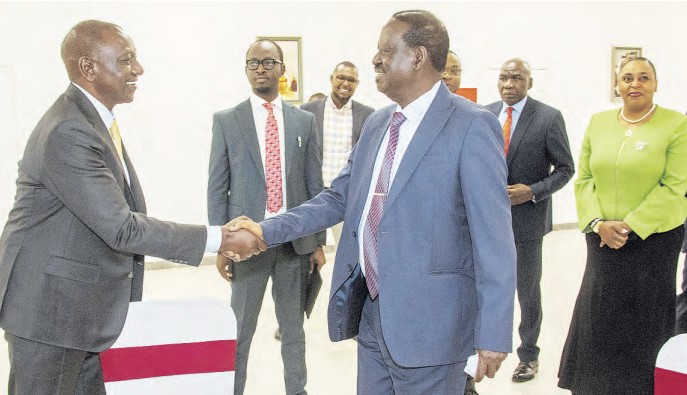
Disquiet and confusion have rocked Raila Odinga’s ODM party amid a silent clamour to formalise his political deal with President William Ruto.
The Star has established that some ODM lawmakers are in a dilemma about handling Ruto’s broad-based government—whether to embrace or criticise it – as the leadership continues to play ‘safe’ on the deal.
The revelation comes in the wake of the party’s stern caution to its members against unsanctioned public political comments on the deal.
“Good evening, I have been instructed by the party leadership to inform you that we are still and remain the minority party in Parliament,” ODM National Assembly Minority Leader Junet Mohamed wrote.
The ‘gag’ order and the persistent declaration of party stalwarts that the party belongs in the opposition, even as it ‘collaborates’ with the government, has thrown members into confusion.
“Are we in government or the opposition? Is there a working arrangement between our party leader and the President or not? We need to be told,” an agitated ODM MP said.
Some lawmakers are now silently pushing the party leadership to formalise the political agreement to end the confusion wracking the party.
“We should be formal in our engagement. We know it is early in the day but we need to be clear even to our supporters,” another MP stated
ODM’s gag order came days after Nyaribari Masaba MP Daniel Manduku claimed the party had fronted Junet’s name to the President for consideration for the vacant Interior CS job.
The revelation appeared to have exposed the deep relationship between ODM and Ruto in what rubbed the party the wrong way.
ODM Nairobi branch chairman George Aladwa said the party supports Ruto’s broad-based government but maintained it was too early for the party to enter into a coalition agreement with the President’s side.
While maintaining the Orange party will eventually form a coalition with like-minded outfits, the party has lined up a series of activities, starting with grassroots elections to strengthen itself.
“We are open to any negotiations but it is still too early to sign any coalition agreements,” the Makadara MP said.
Raila and his party have been closely working with Ruto’s government, with the opposition MPs teaming up with Ruto’s wing to push through their agenda in Parliament.
Last month, ODM teamed up with Kenya Kwanza MPs to impeach former Deputy President Rigathi Gachagua.
Raila has also been supporting controversial government projects, including the plans to lease out key state installations.
The opposition chief particularly defended the government’s deal with Indian firm Adani Group, which has triggered uproar in the country.
“Given the current financial status of the country, PPP is the only way out of cash-intensive projects,” Raila said.
In July, Ruto picked five top ODM officials to his Cabinet.
They include John Mbadi, who is the former ODM national chairman, and appointed National Treasury Cabinet Secretary.
Others are former deputy party leaders Hassan Joho (Blue Economy) and Wycliffe Oparanya (Cooperatives), ex-National Assembly Minority leader Opiyo Wandayi (Energy) and Raila’s close ally Beatrice Askul (East African Community).
The move triggered disquiet in Azimio, with partners challenging ODM to state whether it is in the opposition or government.
“You cannot occupy both roles of opposition and government simultaneously,” PNU leader Peter Munya, an Azimio principal, said.
Ruto has also thrown his weight behind Raila’s bid for the African Union Commission chairmanship.
However, Raila and the ODM party leadership have ruled out joining the government.
In his previous remarks, Raila, who last month relinquished the party leadership to Kisumu Governor Anyang’ Nyong’o, maintained that ODM is not in a coalition agreement with Ruto’s Kenya Kwanza.
“I want to be on record. There is no such alliance, as ODM has not entered into any political coalition with President William Ruto’s government,” he said.
“ODM remains firmly in its position as an opposition party and within Azimio. We are not in coalition with Kenya Kwanza.”
Raila defended the decision to allow five top ODM officials to join President Ruto’s administration, saying it was at the request of the Kenya Kwanza government for expert assistance, which ODM provided.
“They asked for experts from ODM to help them in certain areas. We released them, but that does not mean we joined the Kenya Kwanza government,” Raila said.
Secretary general Edwin Sifuna has also maintained that the party belongs to the opposition.
“ODM remains an opposition party; we are a member of the minority party in the National Assembly and the Senate, and we will continue to execute our role in that capacity,” he said.
Political observers say ODM is not keen to formalise a deal with President Ruto’s party for fear of losing its status as the leading opposition party.
ODM, the single largest party in Azimio coalition, enjoys massive privileges especially in Parliament where it controls top leadership positions.
The party holds the position of minority leadership and whips in both the Senate and the National Assembly.
Its members chair oversight committees in both houses, positions that it could lose if they sign a coalition agreement with the ruling outfit.
Political observer Herman Manyora said ODM has not fully embraced Ruto’s regime because it is ‘ashamed’ of the deal itself.
“They know the people have not and cannot accept what they are doing (working with the government). They are embarrassed and ashamed. That is why they cannot fully embrace it,” he said.
According to the university don, constant blunders by the regime have pitted the government against the people, something that could befall ODM if they fully embrace the government.
While a group led by acting party leader Anyang’ Nyong’o and ODM chair Gladys Wanga have shown a soft spot for the administration, another anti-government team of radicals oscillating around Nairobi Senator Edwin Sifuna has emerged.











